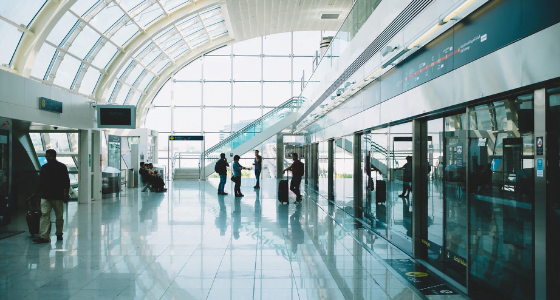Concessionaires made the plea for change in this week’s industry call hosted by the Airport Restaurant & Retail Association (ARRA).
Citing the trade group’s third “Facing Facts” paper, two concessions representatives – Carlos Bernal, CEO of Areas USA, and John Cugasi, vice president of marketing for Paradies Lagardère – made the case for new approaches to business relationships between airports and concessionaires.
Existing contracts are challenging, and Bernal urged airports to continue minimum annual guarantee (MAG) waivers even as the industry sees improvement in passenger traffic and sales. He said concessions companies have collectively taken on hundreds of millions of dollars of debt and while business is improving, concessionaires are still financially precarious. “There were a lot of MAG waivers [from airports during the pandemic], and we would ask that that continue, at least until we hit a level of 85 percent of 2019 [passenger traffic] levels,” Bernal said.
Cugasi suggested that airports take into account the concerns outlined in the paper when soliciting bids for new concessions. “Right now we’re all seeing a lot of RFP activity,” Cugasi noted. “A lot of our guest speakers talked about possibilities and looking at things differently.” He acknowledged the difficulties airports face as public entities but encouraged them “to every degree possible start to incorporate these changes [recommended in the Facing Facts paper],” with particular attention to changes in the minimum annual guarantee (MAG).
As outlined in the ARRA paper, Cugasi also called on airports to “have some flexibility” about mid-term capital expenditure obligations. “Midterm cap ex obligations can be very, very heavy and onerous, especially when traffic is still down,” he said, suggesting airports “by all means, hold the concessionaires to opening day fresh standards, but have some flexibility on the midterm capital obligations.”
Cugasi also pointed to the need for airport involvement in funding assistance, suggesting low- or no-interest loans for ACDBE companies, smart re-opening plans tied to traffic levels, and operational flexibility.
Many of the problems were apparent pre-pandemic, Bernal added. “The reason we’re in the mess that we’re in is we can’t afford to pay the MAG [because] there are things that are happening beyond our control, unfortunately those things were happening pre COVID as well,” he said, citing airlines shifting among terminals and general ups and downs of travel.
“What we are an organization are saying is let’s strive to a variable rent, a per-employment MAG potentially, that is more driven by zone versus a whole concourse or a whole airport,” Bernal continued. “It’s more targeted and allows for some variability … to protect the downside because we really have no say over how enplanements work and where people fly in and out of, but we’re assuming a hundred percent of the risk.”
Bernal also expanded on some of Cugasi’s key points, including the issue of capital expenditures. Street-side restaurants have lower capital spend and yet are typically given longer lease terms, he contended. “Our industry, which has higher costs, both in capital and labor, has shorter terms,” he said. “The math is very, very difficult to pencil out and make work.” Bernal also noted that some airport spaces need conversions to food and beverage locations, requiring intensive build-out of systems and equipment. “That becomes very burdensome for a company to have to develop that infrastructure, which we can’t take with us at the end of the term,” he said.
Labor challenges, product exclusivity, central distribution and pricing caps are among the other issues discussed on the call, presented as some of the longer-term challenges that need to be addressed.
Of course, the overall situation has improved immensely from a year ago, or even six months ago, with summer leisure traffic coming back at an unexpectedly robust pace. But Cugasi warned that even with the busier terminals, concessionaires are “treading water.”
“Certainly, we’re starting to see a light at the end of the tunnel, but by no means are we in a healthy position that we can feel comfortable about yet,” he said. “We still are hoping for that collaboration creative solutions among all of us to get back.”
The ARRA report, “Finding Facts III: Survival, Revival and Braving the Future” can be found on the group’s website at https://www.arra-airports.com.






